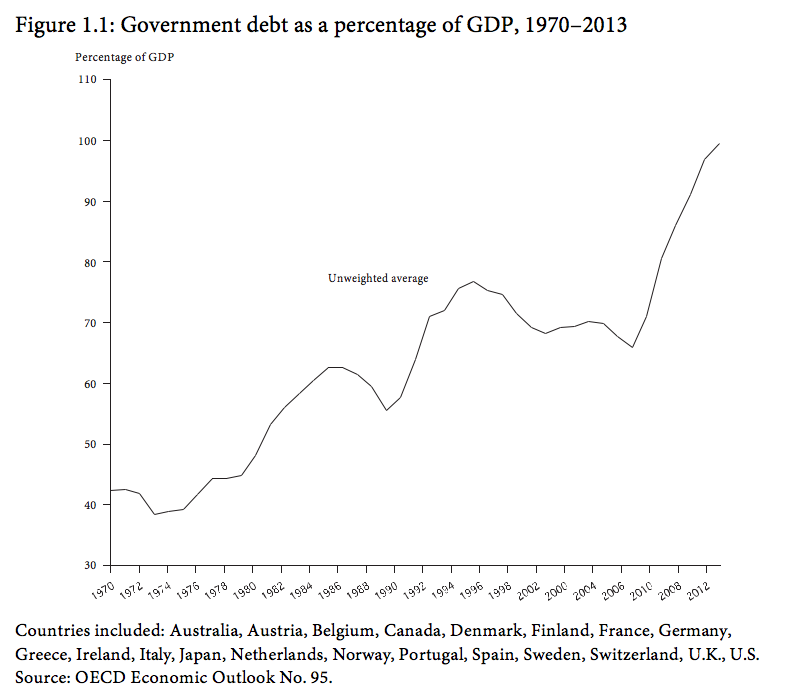Wolfgang Streeck: A Problem with Democracy

In this extract from his new book, How Will Capitalism End?, Wolfgang Streeck argues that although economic progress in the twentieth century made the free-market regime attractive to working class majorities, today the doubts about the compatibility of a capitalist economy with a democratic polity are returning. Charted in the rise of left and right wing populism, and the backlash against poll predictions, Streeck’s work is a timely response to the current state of uncertainty, and addresses the question as to what happens now?
All books on our Emerging Futures Reading List, including How Will Capitalism End?, are 40% off until Sunday, November 20th at midnight UTC. Includes free worldwide shipping and bundled ebooks where available.
Click here to activate the discount.
It is here that discussion of the crisis and the future of modern capitalism must turn to democratic politics. Capitalism and democracy had long been considered adversaries, until the post-war settlement seemed to have accomplished their reconciliation. Well into the twentieth century, owners of capital had been afraid of democratic majorities abolishing private property, while workers and their organizations expected capitalists to finance a return to authoritarian rule in defence of their privileges. Only in the Cold War world did capitalism and democracy seem to become aligned with one another, as economic progress made it possible for working-class majorities to accept a free-market, private-property regime, in turn making it appear that democratic freedom was inseparable from, and indeed depended on, the freedom of markets and profit-making. Today, however, doubts about the compatibility of a capitalist economy with a democratic polity have powerfully returned. Among ordinary people, there is now a pervasive sense that politics can no longer make a difference in their lives, as reflected in common perceptions of deadlock, incompetence and corruption among what seems an increasingly self-contained and self-serving political class, united in their claim that ‘there is no alternative’ to them and their policies. One result is declining electoral turnout combined with high voter volatility, producing ever-greater electoral fragmentation, due to the rise of ‘populist’ protest parties, and pervasive government instability. [1]
The legitimacy of post-war democracy was based on the premise that states had a capacity to intervene in markets and correct their outcomes in the interest of citizens. Decades of rising inequality have cast doubt on this, as has the impotence of governments before, during and after the crisis of 2008. In response to their growing irrelevance in a global market economy, governments and political parties in OECD democracies more or less happily looked on as the ‘democratic class struggle’ turned into post-democratic politainment. [2] In the meantime, the transformation of the capitalist political economy from post-war Keynesianism to neoliberal Hayekianism progressed smoothly: from a political formula for economic growth through redistribution from the top to the bottom, to one expecting growth through redistribution from the bottom to the top. Egalitarian democracy, regarded under Keynesianism as economically productive, is considered a drag on efficiency under contemporary Hayekianism, where growth is to derive from insulation of markets – and of the cumulative advantage they entail – against redistributive political distortions.
A central topic of current anti-democratic rhetoric is the fiscal crisis of the contemporary state, as reflected in the astonishing increase in public debt since the 1970s (Figure 1.1). Growing public indebtedness is put down to electoral majorities living beyond their means by exploiting their societies’ ‘common pool’, and to opportunistic politicians buying the support of myopic voters with money they do not have. [3] However, that the fiscal crisis was unlikely to have been caused by an excess of redistributive democracy can be seen from the fact that the build-up of government debt coincided with a decline in electoral participation, especially at the lower end of the income scale, and marched in lockstep with shrinking unionization, the disappearance of strikes, welfare-state cutbacks and exploding income inequality. What the deterioration of public finances was related to was declining overall levels of taxation (Figure 1.2) and the increasingly regressive character of tax systems, as a result of ‘reforms’ of top income and corporate tax rates (Figure 1.3). Moreover, by replacing tax revenue with debt, governments contributed further to inequality, in that they offered secure investment opportunities to those whose money they would or could no longer confiscate and had to borrow instead. Unlike taxpayers, buyers of government bonds continue to own what they pay to the state, and in fact collect interest on it, typically paid out of ever less progressive taxation; they can also pass it on to their children. Moreover, rising public debt can be and is being utilized politically to argue for cutbacks in state spending and for privatization of public services, further constraining redistributive democratic intervention in the capitalist economy.
Institutional protection of the market economy from democratic interference has advanced greatly in recent decades. Trade unions are on the decline everywhere and have in many countries been all but rooted out, especially in the U.S. Economic policy has widely been turned over to independent – i.e., democratically unaccountable – central banks concerned above all with the health and goodwill of financial markets. [4] In Europe, national economic policies, including wage-setting and budget-making, are increasingly governed by supranational agencies like the European Commission and the European Central Bank that lie beyond the reach of popular democracy. This effectively de-democratizes European capitalism – without, of course, de-politicizing it.
Still, doubts remain among the profit-dependent classes as to whether democracy will, even in its emasculated contemporary version, allow for the neoliberal ‘structural reforms’ necessary for their regime to recover. Like ordinary citizens, although for the opposite reasons, elites are losing faith in democratic government and its suitability for reshaping societies in line with market imperatives. Public Choice’s disparaging view of democratic politics as a corruption of market justice, in the service of opportunistic politicians and their clientele, has become common sense among elite publics – as has the belief that market capitalism cleansed of democratic politics will not only be more efficient but also virtuous and responsible. [5] Countries like China are complimented for their authoritarian political systems being so much better equipped than majoritarian democracy, with its egalitarian bent, to deal with what are claimed to be the challenges of ‘globalization’ – a rhetoric that is beginning conspicuously to resemble the celebration by capitalist elites during the interwar years of German and Italian Fascism (and even Stalinist Communism) for their apparently superior economic governance. [6]
For the time being, the neoliberal mainstream’s political utopia is a ‘market-conforming democracy’, devoid of market-correcting powers and supportive of ‘incentive-compatible’ redistribution from the bottom to the top. [7] Although that project is already far advanced in both Western Europe and the United States, its promoters continue to worry that the political institutions inherited from the post-war compromise may at some point be repossessed by popular majorities, in a last-minute effort to block progress towards a neoliberal solution to the crisis. Elite pressures for economic neutralization of egalitarian democracy therefore continue unabated; in Europe this takes the form of a continuing relocation of political-economic decision-making to supranational institutions such as the European Central Bank and summit meetings of government leaders.
--------------------------------------------------------
[1] See Armin Schäfer and Wolfgang Streeck, eds, Politics in the Age of Austerity, Cambridge: Polity 2013.
[2] Walter Korpi, The Democratic Class Struggle, London: Routledge and Kegan Paul 1983; and Crouch, Post-Democracy.
[3] This is the Public Choice view of fiscal crisis, as powerfully put forward by James Buchanan and his school; see for example Buchanan and Gordon Tullock, The Calculus of Consent: Logical Foundations of Constitutional Democracy, Ann Arbor: University of Michigan Press 1962.
[4] One often forgets that most central banks, including the BIS, have long been or still are partly under private ownership. For example, the Bank of England and the Bank of France were nationalized only after 1945. Central bank ‘independence’, as introduced by many countries in the 1990s, may be seen as a form of re-privatization.
[5] Of course, as Colin Crouch has pointed out, neoliberalism in its actually existing form is a politically deeply entrenched oligarchy of giant multinational firms; see Crouch, The Strange Non-Death of Neoliberalism.
[6] See Daniel A. Bell, Beyond Liberal Democracy: Political Thinking for an East Asian Context, Princeton, NJ: Princeton University Press 2006; and Nicolas Berggruen and Nathan Gardels, eds, Intelligent Governance for the 21st Century: A Middle Way between West and East, Cambridge: Polity 2012.
[7] The expression ‘market-conforming’ is from Angela Merkel. The Chancellor’s public rhetoric appears deliberately designed to obfuscate and mystify. Here is her September 2011 statement on the subject in original Merkelspeak: ‘Wir leben ja in einer Demokratie und sind auch froh darüber. Das ist eine parlamentarische Demokratie. Deshalb ist das Budgetrecht ein Kernrecht des Parlaments. Insofern werden wir Wege finden, die parlamentarische Mitbestimmung so zu gestalten, dass sie trotzdem auch marktkonform ist, also dass sich auf den Märkten die entsprechenden Signale ergeben.’ A rough translation might run: ‘We certainly live in a democracy and are also glad about this. This is a parliamentary democracy. Therefore the budget right is a core right of parliament. To this extent we will find ways to shape parliamentary co-decision in such a way that it is nevertheless also market- conforming, so that the respective signals emerge on the market.’
Read more from Streeck, as well as more responses to the 2016 USA Presidential Election, on the blog.
How Will Capitalism End? and all the other titles on our Emerging Futures Reading List, is 40% off until Sunday, November 20th at midnight UTC. Includes free worldwide shipping and bundled ebooks where available.
Click here to activate the discount.